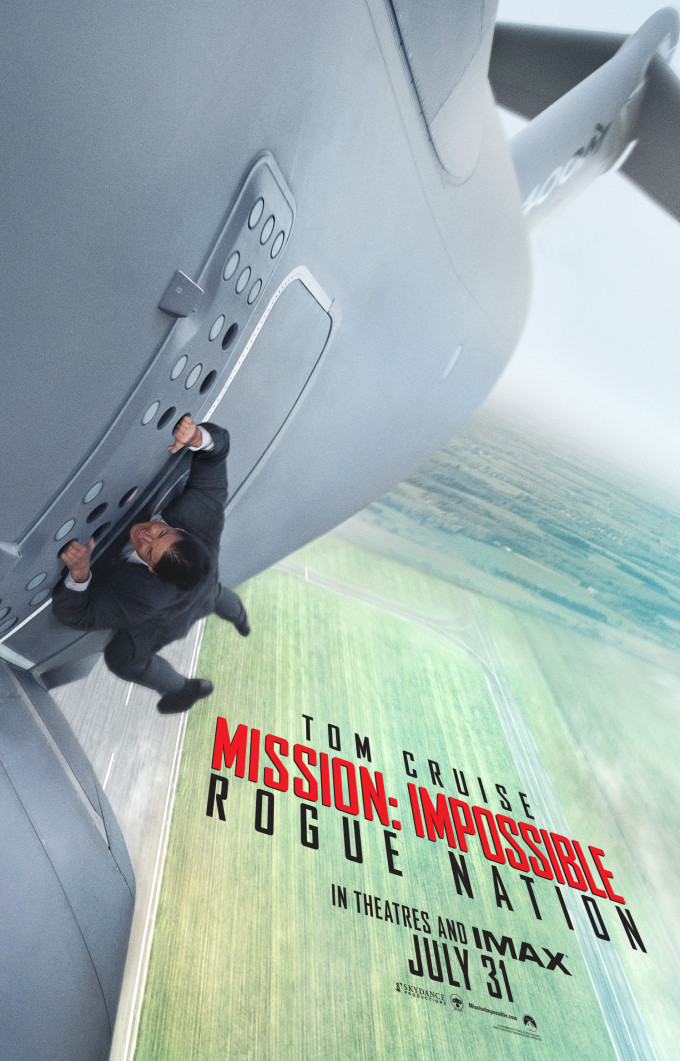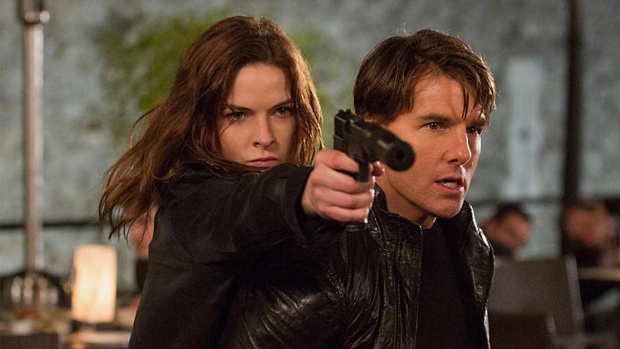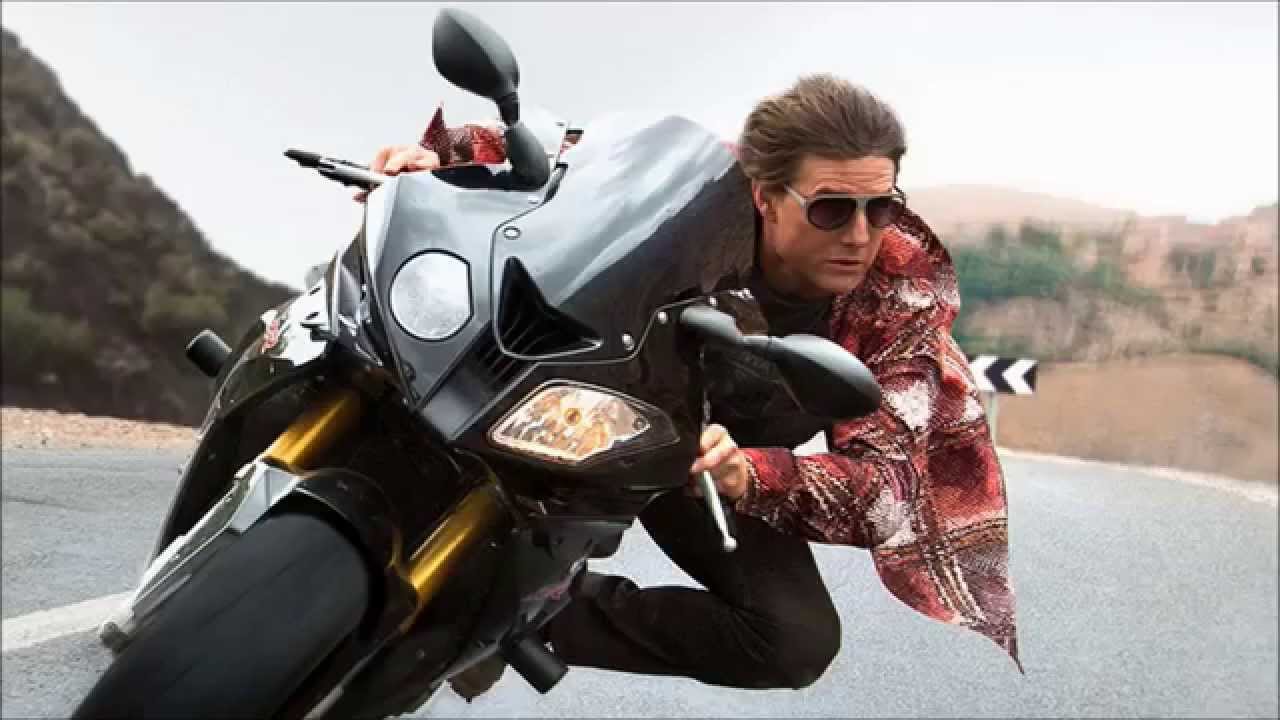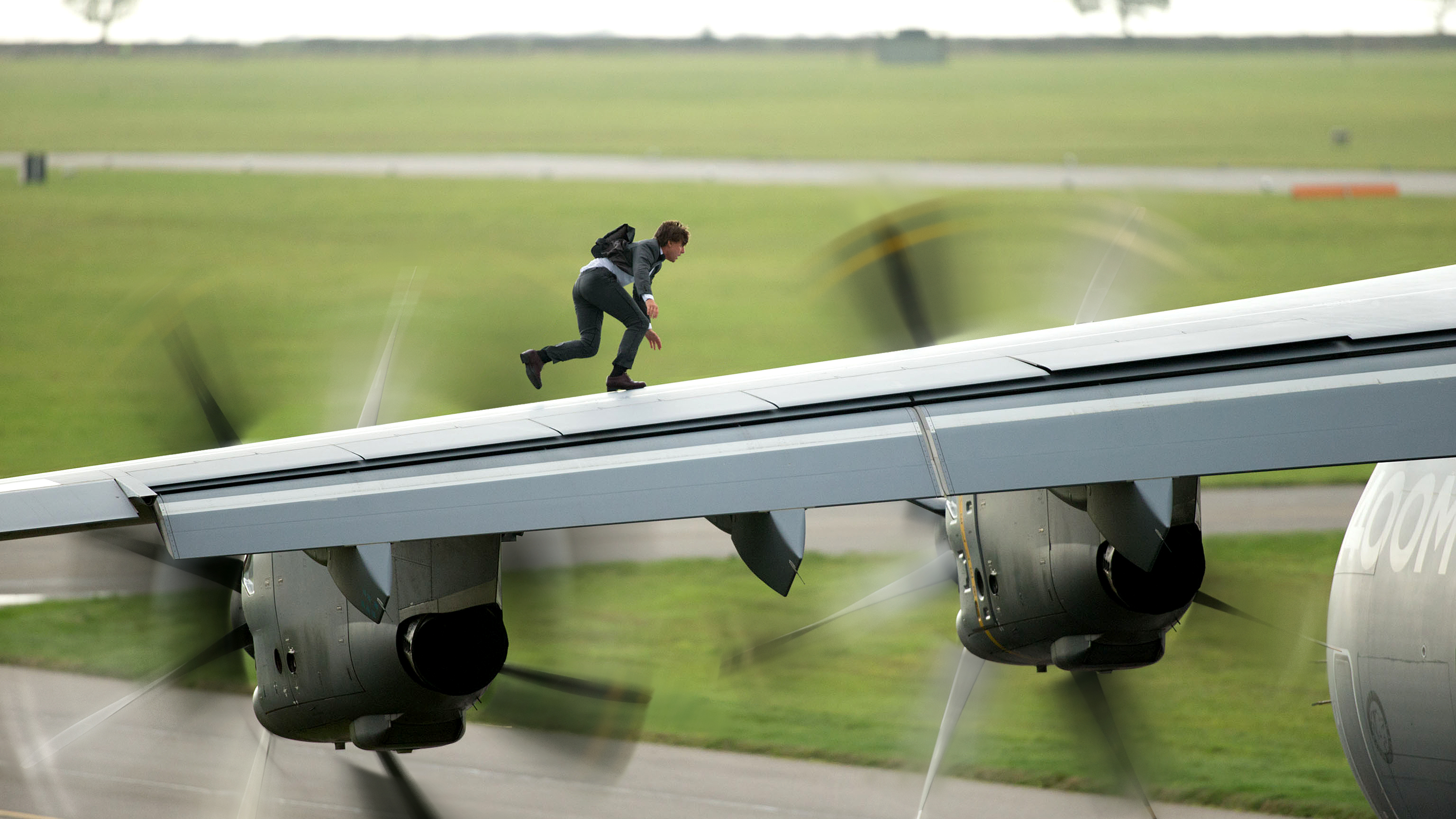Review: Mission: Impossible - Rogue Nation
 Tuesday, August 4, 2015 at 1:25PM
Tuesday, August 4, 2015 at 1:25PM  Tim here. After Mission: Impossible - Ghost Protocol came out in 2011, it seemed that the series had finally figured out how to become the best version of itself and could go on forever doing the same thing. And that's exactly what has now happened: Mission: Impossible - Rogue Nation is slightly worse than its immediate predecessor in nearly every way, slightly better in a couple of others that are especially important, and is light years beyond the first three movies released between 1996 and 2006.
Tim here. After Mission: Impossible - Ghost Protocol came out in 2011, it seemed that the series had finally figured out how to become the best version of itself and could go on forever doing the same thing. And that's exactly what has now happened: Mission: Impossible - Rogue Nation is slightly worse than its immediate predecessor in nearly every way, slightly better in a couple of others that are especially important, and is light years beyond the first three movies released between 1996 and 2006.
Like every M:I film, Rogue Nation is an almost perfect standalone object, with a couple throwaway lines referencing previous adventures and the assumption that you already know and like brash, middle-aged Impossible Missions Force agent Ethan Hunt (Tom Cruise, the series' producer as well), but otherwise assuming that it needs to make its own case for existing (it's enormously gratifying in this age of shared universes and heavily choreographed multi-film narrative arcs that there's still one franchise out there that's willing to just make movies that work solely in reference to themselves. And it does this splendidly, throwing us right into the action with that "Tom Cruise hanging from the side of a plane" setpiece that has been the the focal point of the ad campaign, and building up to bigger and better things from there. [More...]
The story, put together by Christopher McQuarrie (also directing) from an initial draft by Drew Pearce, ends up becoming a little too convoluted and heightened for its own good, but initially, at least, it's a pretty clear piece of spy movie boilerplate: Hunt has been tracking down the mysterious multinational Syndicate, arriving in London, where he's nearly caught and killed, escaping only through the momentary kindness of wavering Syndicate agent Ilsa Faust (Rebecca Ferguson). He goes on the run, while territorial CIA director Hunley (Alec Baldwin) manages to have the IMF absorbed into his agency. Six months later, a fugitive Hunt recruits former IMF agent Benji Dunn (Simon Pegg) to help him As Hunley uses this new activity to close the net on Hunt, former IMF higher-up William Brandt (Jeremy Renner) recruits Luther Stickell (Ving Rhames) to help him find Hunt before the CIA can. Meanwhile, Hunt and Benji meet up with Faust, who now reveals herself to be an MI6 agent deep undercover as the right hand of Syndicate leader Solomon Lane (Sean Harris).
That's about where the convolutions kick in, but the draw of the film is never the story: it's grand action sequences and upbeat, easy banter between the various members of the team. All the script needs to do is to construct a plausible enough ludicrous spy thriller that we won't complain about the interstitials. With those goals in mind, Rogue Nation passes all its challenges with flying colors: this is a terrific action movie, and the character beats rank among the best in the franchise. The expanded role given to Pegg pays off well in giving Cruise a reliable comic scene partner, and Renner is a great deal looser and more charismatic than in the last film. The clear stand-out is Ferguson, a Swedish actress making just her second English-language feature here. It's a performance that, in a fair world, we'll all look back on as her great star-making turn; sharing virtually all of her moments with one of modern cinema's most charismatic stars and photogenic faces in the form of Cruise, she nonetheless runs away with the movie. It's a drag that the Mission: Impossible films seem so weirdly committed to limiting themselves to just one significant female character at a time, but at least Ferguson is the best performance of the most complex woman the franchise has witnessed to date.

The setpieces are impressively shot and cut - the great Robert Elswit is on cinematography duties for the second M:I film running, and Eddie Hamilton edits - so that each of them has a different style: the opening plane stunt has lingering wide shots to stress the grand scope of the aerial action; a motorcycle chase regular cuts over to manic bike-mounted cameras. The best sequence, the one destined to be this film's signature piece, is an elaborate multi-tiered fight sequence that follows Hunt's attempt to stop gunmen at an opera performance, exploiting the bombast of "Nessun dorma" from Turandot to give it rhythm and momentum. It's ballsy and insane how much McQuarrie and company encourage us to to flashback to Hitchcock's legendary Albert Hall sequence in The Man Who Knew Too Much; it's beyond belief how well the film ends up doing in that head-to-head comparison.

It's frivolous tosh; but such very enjoyable, confidently-made tosh! This is big-budget major studio summer spectacle-mongering at its best: tightly paced, ambitiously conceived, superbly executed, and greatly enriched by the instincts and wits of its producer-star Cruise, but by no means dependent on him. It's terrifically entertaining, and if it's not smart, at least it's not stupid, and it's certainly never boring or anything less than fully committed to being the most high-energy entertainment it can be.
B+




Reader Comments (12)
Yes to how great the opera sequence was. Expertly crafted and so many beautiful shots.
Agree with the grade, the strengths and flaws outlined, and Feguson!
Yes, to all of this. The opera house sequence is a masterclass of construction.
All the twisty plot contrivances would normally bother me, but it moves at such a clip that you never have the time (or the inclination, really) to scrutinize.
This movie gives you a lot of bang for your buck.
Tim, I'm always bowled over by how entertaining your reviews are. If this film offers even a fraction of the fun this review does, then Cruise really has accomplished something.
Well argued.
Please do not contribute to Scientolgy and please do boycott MI5.
While I agree that the opera sequence is easily the best action scene in the movie, and I enjoyed Rebecca Ferguson's performance and the platonic relationship she had with Tom Cruise, I have to say that I did not like this movie. As far as entertainment goes, it just proves that the moviegoing public is easily pleased and prefers rehashed content over original ideas. I don't really know why this is doing so well with critics because there are at least three instances I can remember throughout the movie where Cruise would most certainly have been killed or seriously injured, but he walks away unscathed. I can be asked to suspend by disbelief only so many times before I start shaking my head and getting impatient for the credits to finally roll. I gave it a C.
Sean, if you feel that way, don't ever watch another action film, because that's what the genre is all about. You put these heroes into these larger-than-life situations that would very well kill any regular human being, but the audience knows the action hero will never get killed (at least Ethan Hunt will never get killed). The critics aren't judging this one as a realistic film, but as a film within the action genre and they're looking at how it works as an action film (which it does beautifully, and I think that ever since the Mission Impossible films have turned into more ensemble efforts, they have been even better, but most people will see this film to watch Tom Cruise do some dangerous stunts and come out alive)...
Considering there's going to be a new James Bond coming out later this year with Sam Mendes back in the director's chair, I'd expect a competing franchise like the Mission: Impossible series to at least attempt to make realistic action rather than cartoonish goofiness. The genre is most certainly not "all about" invincible heroes, but I can see why you think it would be if you grew up loving the mostly awful superhero movies that have come out in the last 15 years.
And yet, James Bond is never going to die, no matter how close he comes to it. That's the whole point. These action franchises are made to last, so the action hero will survive anything, no matter how implausible it is. IT's the same with Mission Impossible which is, yes, goofy, but within the genre of goofy action movies, it's very well-made, it's thrilling, it's funny and it's exactly what audiences want from a Mission Impossible movie. Does every film need to have realistic action? That's like asking every superhero to be dark and brooding just because Batman was dark and brooding (and you know how Nathaniel feels about that, I agree with him)...
Superhero movies are fantasy. They're allowed to be unrealistic since we know superheroes like Superman are invincible. They create their own world, unlike Mission: Impossible. Look, don't tell me what I should and should not watch just because I expect some plausibility from action movies and you don't. Watching Tom Cruise smash into the interior of an airplane and live, watching Tom Cruise drown and then live, and watching Tom Cruise crash his motorcycle while driving at excessive speeds without a helmet and then live is ridiculous. It's not action. It's comical, and I don't like it. It's okay if you do, I'm not arguing with you about the merits of our tastes, just what I think about this specific movie. But I take it personal when you tell someone like me, who loves most James Bond movies, the original Die Hard and the original RoboCop, to not watch action movies. I'm allowed to dislike something that's popular like M:I5, just like you're allowed to dislike Nolan's Batman movies. And by the way, I'll agree that The Dark Knight Rises was not a good a movie at all.
Ok, I don't get your argument here. How is Ethan Hunt surviving those things any less plausible than James Bond getting shot, practically drowning at the beginning of Skyfall and then coming back to MI6, or John McClane getting thrown off a plane and surviving, or the fact that RoboCop is half robot to begin with? Action films are fantasy films whether they seem realistic or not, because no matter what, the hero will always survive. James Bond, John McClane, Ethan Hunt, these are all superheroes without capes and tights (and slightly more vulnerable than Superman), so I don't see the difference between an action film and a superhero film (most movies are fantasies to begin with). For the record, I do like the Nolan Batman movies (mostly because I admire what Nolan did with it, setting this fantasy in a world that resembles our own), but I don't want every film to take itself as seriously as the Nolan films do. Maybe I should ammend my original statement and say don't watch another Mission Impossible movie, because they're all goofy and cartoony, but they're fun (like the Fast and the Furious films). Though I would argue that Die Hard is also pretty silly (brilliantly crafted and incredibly engaging, but still silly) and before Daniel Craig came on board, the James Bond films had a pretty goofy tone. That's my whole argument, you can't expect too much realism from action movies because the fact that anybody can survive any of the stunts is a fantasy in itself. Now, if you think this movie took it too far with too many stunts, well, that argument I can buy (though I would tell you the Fast and the Furious franchise takes it even farther)...